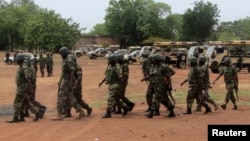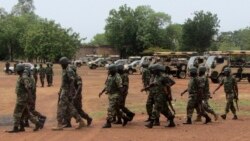Security forces in Nigeria are stepping up pressure on the insurgents who have carried out deadly attacks in the West African nation’s restive northeast region. Several skirmishes between security forces and the fighters have been reported in Adamawa, Yobe and Borno states, which were put under a state of emergency by President Goodluck Jonathan on May 14.
Nigerian troops have been deployed in large numbers in the three states to combat an insurrection that has cost the lives of thousands of innocent Nigerians. The United States is deeply concerned about the increasing insecurity in northern Nigeria and the potential threat it poses to the nation and the region.
The conflict began in 2009, carried on by several groups opposed to the perceived corruption of the central government. The main extremist group is known as Boko Haram. Since 2010, the militants have conducted hit-and-run attacks and suicide bombings mainly against police and security forces, later targeting churches and mosques. Recently, however, they have begun to kidnap Westerners for ransom and use military-grade weapons in their attacks.
In a pitched battle on May 7 in the town of Bama near the border with Cameroon, media reports stated that militants killed at least 55 Nigerian officials and other innocent civilians in a firefight said to include anti-aircraft guns mounted on pickup trucks. Media also report that the militants summarily executed unarmed officials during that raid.
The conflict has also seen an increase in abuses by Nigerian troops searching for and detaining the militants. We are deeply concerned by credible allegations that Nigerian security forces are committing gross violations of human rights, which alienate the population, escalate the violence and fuel extremism.
Recent reports of fighting in the border town of Baga have prompted international calls for an investigation of possible human rights violations committed during the fighting and for accountability for those found to have been involved.
We condemn Boko Haram’s campaign of terror in the strongest terms. But as Nigerian security forces confront the threat, we urge authorities to apply disciplined use of force in all operations, protect civilians in any security response and respect both human rights and the rule of law.
Nigerian troops have been deployed in large numbers in the three states to combat an insurrection that has cost the lives of thousands of innocent Nigerians. The United States is deeply concerned about the increasing insecurity in northern Nigeria and the potential threat it poses to the nation and the region.
The conflict began in 2009, carried on by several groups opposed to the perceived corruption of the central government. The main extremist group is known as Boko Haram. Since 2010, the militants have conducted hit-and-run attacks and suicide bombings mainly against police and security forces, later targeting churches and mosques. Recently, however, they have begun to kidnap Westerners for ransom and use military-grade weapons in their attacks.
In a pitched battle on May 7 in the town of Bama near the border with Cameroon, media reports stated that militants killed at least 55 Nigerian officials and other innocent civilians in a firefight said to include anti-aircraft guns mounted on pickup trucks. Media also report that the militants summarily executed unarmed officials during that raid.
The conflict has also seen an increase in abuses by Nigerian troops searching for and detaining the militants. We are deeply concerned by credible allegations that Nigerian security forces are committing gross violations of human rights, which alienate the population, escalate the violence and fuel extremism.
Recent reports of fighting in the border town of Baga have prompted international calls for an investigation of possible human rights violations committed during the fighting and for accountability for those found to have been involved.
We condemn Boko Haram’s campaign of terror in the strongest terms. But as Nigerian security forces confront the threat, we urge authorities to apply disciplined use of force in all operations, protect civilians in any security response and respect both human rights and the rule of law.














